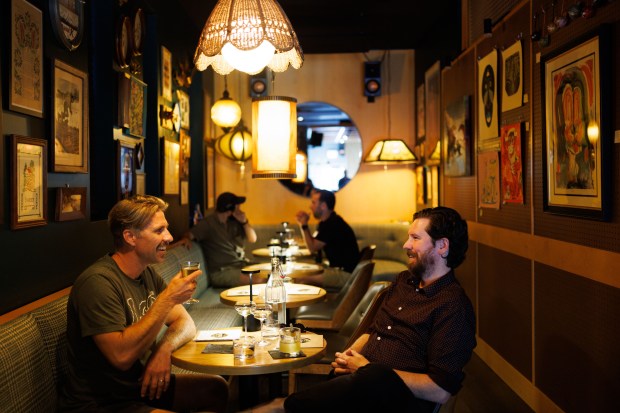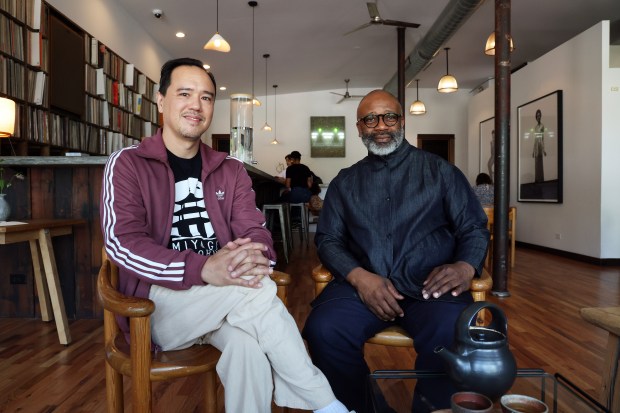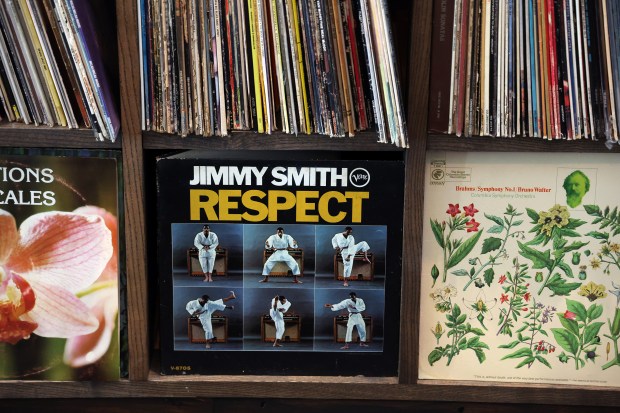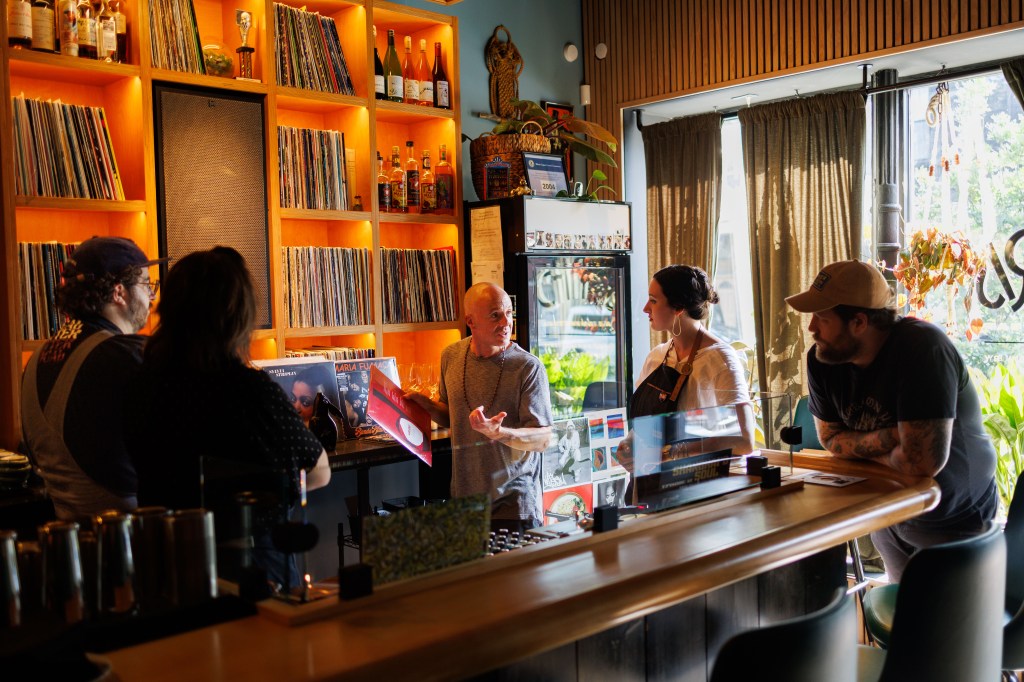There’s no shortage of ways to experience music in Chicago. For that, residents are eternally grateful.
But for those looking to sit and really listen to an obscure single or underappreciated album — communally, maybe discuss it in real time — there’s been a gap. Historically a tradition of record store culture, hosting a dedicated time and place for just celebrating quality audio, or “listening party” sans live performance is pretty hard to come by these days.
Now, audiophilic purists and the avidly curious alike can sit and soak in the sounds at a number of bars built for listening, including the new Charis Listening Bar in Bridgeport, A Listening Space in Washington Park, and CHIRP Radio and Audiotree’s co-presented Both Sides Now monthly listening bar activation at Schubas Tavern in Lakeview.
Both Charis Listening Bar and A Listening Space draw inspiration from experiences in travel and observation, but remain rooted in traditions of jazz “kissas,” or cafes that rose to prominence in Japan after World War II as a way for folks to share and listen to imported jazz albums that would otherwise be expensive and hard to come by; infusing global appreciation and the universal language of music with Midwestern charm.
While a listening bar isn’t a new concept, it’s been fairly under-represented in the city. As of late, there’ve been a number of restaurants adapting the vibe and quality audio expectations of a Japanese jazz “kissa” — Parachute HiFi in Avondale and Wax Vinyl Bar and Ramen Shop in West Town — but the food still takes center stage. Other popular spaces such as Dorian’s in Wicker Park and Mojo’s Vinyl Bar and Listening House in suburban Highwood rely on live music and variety events to entertain.
For Alex Jandernoa, who opened Charis in February, the ethos behind the bar was instilled in him at a young age by his parents, both massive music fans (a mom who’d sneak into Detroit’s Fox Theatre at 16 and a dad who followed The Who’s “Tommy” tour). Jandernoa wanted his space to evoke the memories of traveling with his parents for formative concerts and culinary exchanges, and marry the comforts of home with an impressive audio setup.
“If you look at the first kissa cafes, they weren’t these super elaborate, giant, built-out sound systems. They were quality products people could buy for their homes if they were really rich, but they were put in a space more people could access,” Jandernoa says. “We took that approach and we tried to pay homage to their origins in Japan without appropriating things. When you look at some of the spaces that have existed previous to us, not necessarily in Chicago but around the world, there’s a distinction between a club that has a really good sound system and a listening lounge or room where the bar aspect — the rowdiness, the camaraderie and conversation — was taken away to sit in silence.”
“I think we wanted to really be in the middle,” he continues.
The one real “rule”? No standing room to encourage listening.
In reverence, Jandernoa and team worked with a local record store, tapping Drew Mitchell of 606 Records in Pilsen to curate the music programming, from stocking the bar with vinyl each month, including a “satellite store” that’s refreshed weekly with new and used albums for purchase, to booking DJ’s for Friday nights. Charis’ sound system also echoes history, working with Saturday Audio on the North Side to build a system with both vintage warmth and modern quality and efficiency, using Midwestern Klipsch speakers. Sundholm Studio fashioned interiors where sound was the main priority, with custom ceilings, tons of drywall, bass blockers and air-gapped speakers.
 Eric Wandrey, left, and Nick Carlson talk at Charis Listening Bar in Bridgeport, July 9, 2025, in Chicago. (Armando L. Sanchez/Chicago Tribune)
Eric Wandrey, left, and Nick Carlson talk at Charis Listening Bar in Bridgeport, July 9, 2025, in Chicago. (Armando L. Sanchez/Chicago Tribune)
“[Charis] is an ode to my parents and everything they’d want in a bar,” he adds. “Something that’s cozy [the bar seats 35] and homey and reminds them of a Midwestern bar you can spend the whole night in, but where the cocktails surprise you and you hear a record you don’t know but it reminds you of a time period that you love. When you find your music nerds and your foodie, beverage nerds, sometimes you find your people.”
For 606 Records owner Mitchell, the cross-pollination of communities feels like an exciting evolution for music fans and is not only a newer way to experience music in the city, but the neighborhoods and micro-communities themselves.
“I’d been to Tokyo and some of the listening bars there and I thought it was a great idea. When [Alex] approached me, it sounded like he wanted to do it right and for the right reasons,” Mitchell remembers. “You have bars and record stores where you can learn about new music and discuss and debate as independent experiences and now there’s a hybrid of the two. And to get back to the bar as a community space — whether you drink or don’t drink. Charis has so many N/A options, their mocktails are to die for — and this hybrid bar/record store concept is great. In Bridgeport, you have Lumpen Radio a block away. There are great female DJs. Producer/DJ Vick Lavender is nearby at Bridgeport Records. It’s important to know and respect the community.”
He continues, “I went [to Charis] the other night and this record was playing — it wasn’t anything other than the music. The sound was so warm. There was something so different where I was looking at everyone at the bar like, ‘Are you feeling this?’”
 Nigel Ridgeway, left, and Theaster Gates at A Listening Space, 305 E. Garfield Boulevard in Chicago on June 16, 2025. The listening room has hundreds of recordings and people sit and drink tea. (Terrence Antonio James/Chicago Tribune)
Nigel Ridgeway, left, and Theaster Gates at A Listening Space, 305 E. Garfield Boulevard in Chicago on June 16, 2025. The listening room has hundreds of recordings and people sit and drink tea. (Terrence Antonio James/Chicago Tribune)
Similarly, Theaster Gates, renowned installation artist from Chicago’s West Side and founder and executive director of the Rebuild Foundation — a nonprofit that works to repurpose spaces on the South Side to celebrate art, began conceptualizing A Listening Space after spending time in Gugulethu just outside of Cape Town, South Africa. Hearing stories of and visiting “shebeens” — once-illegal spaces predominantly operated by women (known as Shebeen Queens) where homebrewed alcohol was served without proper licenses; now contemporary, cultural gathering spaces serving a similar purpose to famed juke joints — and listening to records that reflected the diaspora and more.
“By the time I got to visiting Japan and the kissas, you noticed there were similar loops. Black GI’s were going to Japan and sharing their music and the Japanese became enamored with Black American jazz and you’d see the rise of these listening spaces,” Gates recalls.
“That tradition of gathering to sit and listen is sort of lost. Everybody talks about the fact that their parents and aunties and uncles in the ‘70s and ‘80s had bars in their basements and you may have gone out to a tavern or something like this, but by and large, people kicked it at home,” he continues. “You couldn’t really afford to go out, you’d play spades and host at home. There’s nothing like hearing Marvin Gaye up close and intimate in a place where it doesn’t feel like the primary goal is for you to spend money, the goal is for you to be together with music and people.”
 Records at A Listening Space, 305 E. Garfield Boulevard in Chicago, June 16, 2025. (Terrence Antonio James/Chicago Tribune)
Records at A Listening Space, 305 E. Garfield Boulevard in Chicago, June 16, 2025. (Terrence Antonio James/Chicago Tribune)
Replacing the beloved Currency Exchange Cafe for this year, A Listening Space is seen as an opportunity for the love of music to shape the “resonance and presence” of a space that’s uncoupled from commerce, according to Gates. Opened in January, it specifically showcases the catalogue of Dinh Nguyen, French Vietnamese renaissance man turned DJ Natty Hô turned chef, while offering complimentary Horii Shichimeien tea, courtesy of the on-staff “TeaJ” (or DJ serving tea).
With over 14,000 records, CDs, cassettes and other audio ephemera, much is focused on music of the Caribbean, particularly from the islands of Réunion (where Dinh had spent much time) and Mauritius, as he collected for more than 20 years, as well as jazz, classical, funk and experimental genres.
Spending time in Arles, France, in 2023 for an exhibition of his own vinyl collection at the Luma Foundation, a visit with friend and executive chef Armand Arnal of La Chassagnette led Gates to Dinh’s family, who were looking to rehouse his meticulously stored albums after his death in 2022. Upon purchase, he promised Nguyen’s widow Danielle and daughter Millie that he’d steward it into the public sphere. The end of the cafe provided the chance. After minimal refurbishing, what was originally a business became a living, potent archive. Gates, and frequent community collaborator Nigel Ridgeway of Miyagi Records, say it has become part of the neighborhood’s cultural livelihood.
“As a business owner, it’s important to have that ethos of surviving and thriving together,” says Ridgeway, who opened Miyagi with business partner Marco Jacobo under the Rebuild Foundation’s Creative Entrepreneurship Program. “As a fan, it’s important to have a third space. Every album in that collection was new to me. Caribbean, Afro-Latin diaspora — he gets very deep. It was big for me personally. It’s a constant learning experience. A lot of culture has been stripped from the South Side over time, so to have places to embrace and enjoy it is incredibly important. Everyone who comes into the shop has a different level of experience with records, with collecting, with listening, with whatever their set-up is back home. The main reason we send everyone over there is to show look, this is the high bar of what listening to a record can be and why we listen to it on vinyl, why it’s something to enjoy. Going over there, it’s always new.”
A place to simply listen can also be a lower barrier to connection for folks easily overstimulated or anxiety-riddled by going to live events alone. Coming out of the COVID-19 lockdown years, Jenna Chapman, booking and promotions coordinator for CHIRP Radio, said she felt less confident interacting with strangers at large group events like concerts or buzzing third spaces like bars.
This was the impetus for the monthly listening bar activation Both Sides Now in Schubas’ upstairs lounge.
“I figured there might be an appeal to an event with a clear shared interest involved, where it was socially acceptable to come alone and not be forced to talk to people. I know I missed the feeling of being at a bar or cafe, but in the early days, especially, I didn’t always feel up to trying to remember ‘how to people’ or going out just to go out. Both Sides Now creates that environment while taking some of the social pressure off.”
Folks can expect a “menu” of four LPs selected by CHIRP DJs. There’s even a WhatsApp group where those who want to can join an open forum for music discussion at the event to avoid talking over the music onsite. Turnout has steadily increased since the series soft-launched in November 2023, particularly after a Chicago-based Reddit thread for vinyl enthusiasts took off in 2024. Chapman and Dan Apodaca, Schubas and Audiotree’s talent buyer, argue that the appeal for music folks is in the album format as an art itself. In the age of streaming, it feels increasingly rare for albums to be put together with intention (sequenced, consumed as a complete body of work) as opposed to an assortment of tracks that can just as easily stand alone or together.
“The structure of Both Sides Now helps remind folks that there can be additional meaning to be found in music when it’s approached that way,” she says.
Still, for many, the choice to go out is the choice to see and be seen. Can listening truly be just as thrilling as being swallowed by the crowds?
“We, in modern life, exist in a perpetual state of sensory overload. That can be exhausting,” Apodaca reminds.
“It’s really nice to be able to go someplace comfortable, specifically not look at any of your notifications, and just chill. Give your brain some quiet, art-processing time playing whole albums. Especially those albums by artists who, for various reasons, you can’t go see live. I think that can be very therapeutic and very helpful. But a world like this where listening bars and traditional live events definitely happily coexists. One doesn’t replace the other.”
Jessi Roti is a freelance writer.
